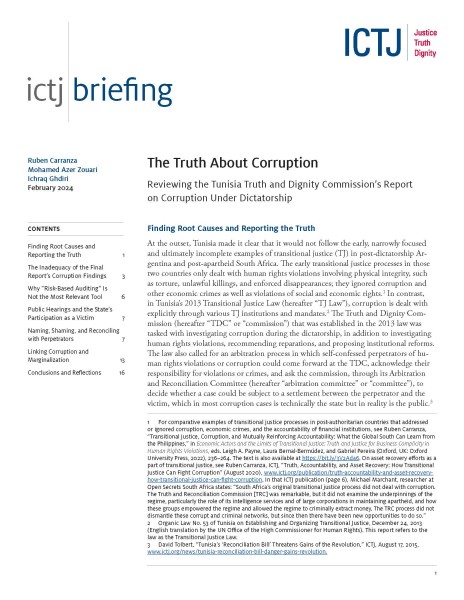We work side by side with victims to obtain acknowledgment and redress for massive human rights violations, hold those responsible to account, reform and build democratic institutions, and prevent the recurrence of violence or repression.
The Truth About Corruption: Reviewing the Tunisia Truth and Dignity Commission’s Report on Corruption Under Dictatorship
This briefing paper examines the Tunisian Truth and Dignity Commission’s approach to investigating Ben Ali dictatorship-era corruption crimes and identifying responsible institutions and individuals, and whether it laid the foundation for accountability and reparation. While it fell short in some aspects of its mandate, it succeeded in connecting corruption to political repression and to the dictatorship’s neoliberal economic policies that marginalized the country’s poorest regions, where the revolution and Arab Spring began.

With respect to fulfilling its mandate to investigate and to hold accountable those who committed or enabled corruption during the Ben Ali dictatorship, Tunisia’s Truth and Dignity Commission (TDC) accomplished the most basic roles of a truth commission, from conducting a public hearing, to taking statements from victims and witnesses, to releasing a report. To some extent, the TDC was also able to link corruption to the marginalization of the country’s poorest regions and to identify potential funding for reparations. The commission had legal and political power to obtain information, a USD $19 million budget, 567 staff, and significant public attention. It had the resources and power to systematically seek and tell the truth and draw a roadmap for dismantling the dictatorship’s corruption network, including laying the foundations for prosecuting the most corrupt Ben Ali family members, cronies, and officials. It also had a clear mandate to identify the root causes of marginalization in Tunisia. There were significant political obstacles to fulfilling its mandate, but the TDC simply failed to maximize and properly use these tools, resources, and powers. It also undermined its own credibility by the lack of transparency in the “arbitration” and “reconciliation” process it followed in dealing with suspected perpetrators of corruption. Nevertheless, the TDC’s final report tells a larger set of truths. Its findings and recommendations on corruption can be linked to its findings on repression committed by the dictatorship, as well as to its recommendations involving the neoliberal economic and social policies prescribed by the World Bank and International Monetary Fund and implemented by Ben Ali and now his successors. The Tunisian experience also reaffirms that, in transitional justice processes in the global South, corruption and economic crimes ought to be examined for truth telling to be complete and for accountability to include those who profited from or enabled corruption.